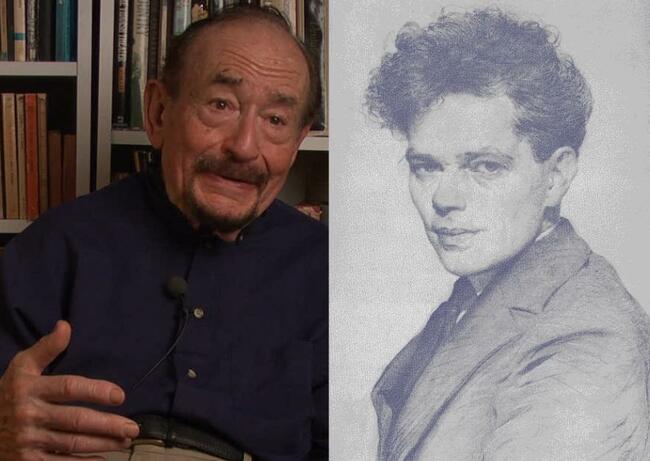Remembering Joseph Esselin z"l
Poet and playwright Joseph Esselin, the son of the Yiddish writer Alter Esselin, died on February 12, 2016.
Esselin once wrote that when he was a child, his father "would often remind me that 'du shtamst fun yikhes'—a Yiddish phrase that, when he used it, roughly meant that he thought I should remember that I came from a rich tradition."
And, indeed, Joe Esselin did pay great homage to that rich tradition: In addition to his own writing—which included the plays The Bookstore, Child of Destiny, and A Long Way from Eden, and the children's story "The Enchanted Pond"—Joseph Esselin dedicated himself to translating to English the Yiddish poems of his father, who by day worked as a carpenter and at night worked on his poetry.

In 2013, Joe Esselin talked about his and his father's work and what it was like growing up with a writer parent in an interview with our Wexler Oral History Project, for the project's series "Beyond the Books: Yiddish Writers and Their Descendants." In this excerpt from that interview, he reflects on an invaluable gift he received from his father: an appreciation for the power of words:
Alter Esselin's poetry collection Lider fun a midbernik is available in Yiddish in our Steven Spileberg Digital Yiddish Library.
One of Alter Esselin's poems that Joe Esselin translated, "And What Will You Do With the Bequest?", considers the cultural and creative inheritance pass from father to son:
And What Will You Do With the Bequest?
Dear little boy,
What will you do when my time will come
And I will belong to the grass of ancestry,
And will not be here to kiss and fondle you—
A Homo novus—a new kind of Jew?
What will you then do with the imposing bequest
Which I will leave to you here in these open shelves?
Jewels for the weekday, pearls for holy day and Sabbath;
Generations have stored a treasure here.
What will you then do with the old, brown folios:
“The Duty of the Law,” “The Life of Man,” “Righteous Measures,” and “Talmudic Legends,”
And thin, thin books of verse—presents to me
From Yiddish princes, kings.
My heart tells me that you will not need them
Even though (of this I am sure) you will seek
Their treasure in other accents, other tongues.
And one day, the Junkman will come by—a Jew with side locks
Who (after a bath) looks like the King of Spades.
He will flood the streets with his nostalgic cry:
“Any rags, and bottles today?”
Call him in and ask him this:
Has he a good supply of sturdy cord?
And he has not (God forbid) a rupture?
Can he carry a heavy load of culture?
Then show him your inheritance—the finest paper!
And don’t forget the souvenir in the cellar—
Your grandfather’s thallis and tefillen
(So musty now that even the cat will not deign
To play with its tassels or toy with the ribbon);
Give a last caress to the smooth silk
As if you were closing my dead eyes
And help the Junkman load his wagon.
But before he goes, if you wish,
Tell him in fewest words—
Like ginger sweetening the air—
That you are descended from princes:
Your granddad, a scholar and savant,
Your father a poet and recluse;
And their residue is this wagonload
Which goes through fire to God.
Reprinted with permission from Poems by Alter Esselin (esselin.com).
